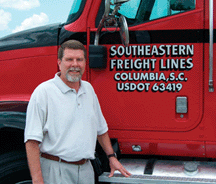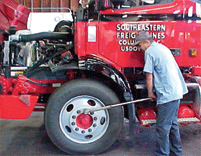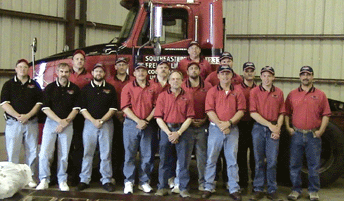Quick Bio
Name: David Foster
Company: Southeastern Freight Lines
Title: Vice president of field maintenance
Other Positions Held: Director of maintenance, assistant director of maintenance, maintenance systems specialist
Industry Experience: 32 years
Associations: TMC, ASE, South Carolina Trucking Association Maintenance Council
To most fleets, best practices are defined by preventive maintenance, purchasing and other mission-critical business aspects.
To David Foster, vice president of field maintenance for Southeastern Freight Lines, best practices start with people.
“We are keen on listening to our people and  implementing suggestions and changes that they make,” Foster says. “Some of the best ideas we’ve had have come from the floor.”
implementing suggestions and changes that they make,” Foster says. “Some of the best ideas we’ve had have come from the floor.”
Team building within work groups and between management and staff, called individualized quality groups, occurs monthly.
“We have a team structure that starts at the bottom and works its way up,” he says. “Everybody has a team that they are a part of, such as technicians, foremen and parts people.”
Each team meets monthly in a short, but formal, meeting to cover all relevant issues, including service topics and maintenance campaigns.
“We conduct open discussions on shop issues, work shift topics or the company as a whole,” Foster says. “It is formally documented and sent up the line so everybody in a position of leadership – as well as everybody’s peers – can see the minutes and comments. It’s designed to help us share ideas and communicate within and across work teams.”
A maintenance shop would have from three to six work groups, depending on its size. Employees in each shop have the opportunity to see each other’s comments.
Building teams
Southeastern places a heavy emphasis on promoting from within. “About 90 percent of people in leadership positions have been with this company for a long time, and they all started on the floor turning wrenches. We ask employees to fill out career development forms and – as opportunities become available – we look at internal candidates first. The forms also give us the opportunity to recognize people who want to advance so we can make the extra effort to try to develop them and make them ready for their next opportunity.

All job openings, including management positions, are posted company wide so every employee has the opportunity to know about opportunities for advancement. But, if a technician wants to remain a technician, that’s OK, too.
“We try not to limit our technicians from a pay standpoint,” Foster says. “Some companies might have a certain number of positions for A, B and C technicians at each of their shops. We don’t hold them back to fit predetermined classifications. If a guy wants to move up from a B to an A technician, good for him.”
While that move boosts their pay and qualifies them to perform more complex work, they also have to do what’s best for the team.
“The A technician should be able to do anything on a truck, which means he still may have to change oil. We like having versatile staff, not technicians who can only do certain tasks.”
Training and recruiting
Training is an important element of team building and best practices. Southeastern’s Associate Continuing Education program for technicians consists of 16 self-paced training modules. More than 75 percent of technicians have taken one of more of its courses, according to Foster.

“If they complete all 16 modules, we bump up their pay, and as they complete each module, we recognize them internally.”
Technicians also receive recognition and a boost in pay for completing the ASE heavy-duty certification program. Southeastern has a full-time person on its corporate staff whose primary responsibility is coordinating and conducting all internal training and service topic publishing. Each of the company’s 22 shops also has on-site training conducted by outside vendors.
“This year, we are taking all the technicians who completed the ASE program to Michelin Tire North America’s headquarters in Greenville, S.C., for a special tire-training program,” Foster says. “We’ve also just hosted our second-annual Southeastern Skills Challenge for the top 12 technicians from across our service areas. We had 12 technicians from across our system come to our headquarters in Columbia and compete for the opportunity to represent Southeastern at the national TMC technician’s competition in Austin, Texas, this year. We also added a new twist to our competition by bringing three supervisors to compete amongst themselves.”
In addition to improving skills, the focus is on self-improvement and having fun, Foster says.
“We have good programs in place, and we spend a lot of money training technicians to help them grow. This makes them feel better about their job, and the company also benefits. We want those technicians who were just in Columbia to go back home and inspire everybody else to want to participate in these competitions. We want everybody to want to earn the opportunity to come to Columbia and compete against their peers.”
While attracting new technicians can be a challenge, retaining them is not, according to Foster.
“We don’t have a lot of technician turnover. They tend to stay with us unless working the night shift becomes an issue.”
Most of the company’s shops operate three shifts a day, and some technicians don’t like working the second or third shift, he says. When the company needs to hire technicians, it participates in job fairs, visits local technical schools, advertises in local papers and uses Internet job search sites, as well as its own Web site.
“We also ask all of our vendors if they know anybody who is looking for work,” Foster says. “Those guys are some of the best leads for knowing where there is a good technician who may not be happy or may be out of work.”
